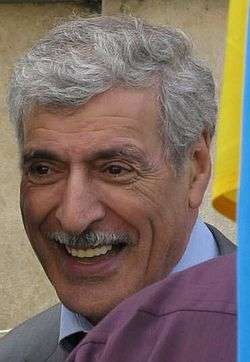Ferhat Mehenni

Ferhat Mehenni, also known as Ferhat Imazighen Imula, is a Kabyle artist, a political activist and the founder and first President of the Movement for the Self-Determination of Kabylia. Since 1 June 2010 he has been the President of the Provisional Government of Kabylia, a government in exile that the movement set up in France.[1] He has been a Laureate of the Gusi Peace Prize since 23 July 2013.
In 2012, Mehenni assumed a controversial position by visiting Israel where he voiced his support for and solidarity with Israel, comparing it to Kabylie: "We are in a hostile environment. Both countries share kind of the same path, but Israel already exists – that’s the only difference."[2]
Activism
Mehenni was born on 5 March 1951 in Illoula Oumalou, Tizi Ouzou Province, Algeria. Having graduated from the University of Algiers with a degree in political science, Mehenni made his first steps into the world of music in 1973[3] by winning the Algiers Modern Music Festival's first prize. It was soon after this success that he began his career as a protest singer and political activist. He was notably hostile towards the Algerian government and extremists; this led to him being arrested 13 times, imprisoned for three years, and tortured by government forces.[4] After the Black Spring massacre in Kabylie triggered by the Algerian army killing of a young Kablye man, Massinissa Guermah in detention, he, first, established the MAK, Movement for the Autonomy of Kabylia, a political movement calling for the political autonomy in Kabylia. In 2015, the MAK movement passed over from the large autonomy claim to Self-determination[5]. The assassination of his eldest son (Améziane Mehenni) in 2001 is regarded by some as a punishment to his fight for autonomy. Though others suspect it was a case of mistaken identity and that Ferhat was the real target.[3]
Music
- Chants berbères de lutte et d'espoir "Berber songs of struggle and hope" (1983)
- Tuγac n ddkir "Songs of steel, love and liberty" (1994)
- Tuγac n tmes d waman "Songs of Fire and Water" (1996 and 2001)
- I Tmurt n Leqvayel "Hymn to Kabylia" (2002)
- Adekker d usirem "Requiem and Hope" (2004)
Mehenni comes from an oral tradition where the song acts like the newspaper or political speeches in European societies.
Mehenni is primarily a political activist who, living in a society with strong oral traditions, uses music to convey those ideas. It is quite difficult to separate the politician from the singer.
Bibliography
Mehenni is the author of Algérie : La Question Kabyle, published in 2004, in which he explains his ideas about Kabyle nationalism.
References
- ↑ https://www.kabylie-gouv.org/]]. Missing or empty
|title=(help) - ↑ Sharon Udasin; Jan Koscinski (2007-05-27). "Algeria's Kabylie craves friendship with Israel". Jerusalem Post. Retrieved 2014-08-20.
- 1 2 "Dissident watch: Ferhat Mehenni". Middle East Quarterly. 2010-03-22. Retrieved 2013-04-07.
- ↑ "Dissident watch: Ferhat Mehenni". Middle East Quarterly. 2010-03-22. Retrieved 2010-11-01.
- ↑ https://www.makabylie.org/